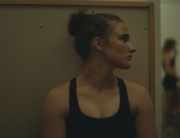
Rachel McAdams, left, and Abby Ryder Fortson in Are You There God? It’s me, Margaret. (Dana Hawley/Lionsgate)
Author Judy Blume’s best-selling books earned the fierce love of 1970s teenagers with their empathetic understanding of awkward, growing bodies, and muddled young minds. For all the titles’ enduring popularity, they have only received cursory film treatments or a few seasons on TV. Based on her 1970 novel, Are You There, God? It’s Me, Margaret is a long-awaited feature film directed by Kelly Fremon Craig, with Blume serving as executive producer. It’s a gentle, knowing portrait of an 11-year-old girl undergoing puberty and a religious identity crisis.
Margaret Simon feels as though her life is falling apart when her parents blithely announce a relocation from a Manhattan apartment to leafy 1970 suburbia. The whole family needs to adjust, but the move is hardest on Margaret, who is handling a new school and uneasily trying to fit in with a clique of tween girls obsessed with growing breasts and local boys. Games of spin the bottle and other social competitions alternately delight and mortify Margaret. Experiments with religion pique her interest but leave her feeling let down—when Margaret prays, God never reveals the answers to her questions. Margaret’s mother is Christian, her father Jewish, and the sudden reappearance of mom’s estranged parents is about to ruffle the household.
Margaret’s issues may feel like small potatoes to today’s sophisticates, but the film treats them with seriousness and sympathy. Charming performances go a long way to investing the scenario with credibility. Rachel McAdams is a soulful, perceptive mom; Bennie Safdie plays against type as a laid-back, affectionate dad; and Kathy Bates has a borscht-belt ball as an overbearing but loving Jewish grandmother. Lead actress Abby Ryder Fortson—her dark eyes alive with hope and the contravening fear of being disappointed—is tuned in to Margaret’s insecurity, and also her bravery. Fortson’s performance is crucial, and the film would be lost without her. Luckily, she more than delivers, making us care about a young girl desperate to fit in while trying to reach her own conclusions about the confusing world around her. It’s a rewarding effort: Margaret learns from mistakes and figures out how to understand others more honestly and fairly.
Critics may pull out the knives on this movie. It takes place in a mostly White environment and does not treat its few relatively minor non-White characters any differently than others. Margaret also comes from relative privilege (and a loving home). The film is not intersectional or militant in any way, but private and particular on one hand, universal on the other in the way it handles coming of age. Hopefully for some, it will strike a chord: It is sweet, positive, and above all patient. Now that one of Blume’s books has finally been made into a film, here’s hoping that some viewers will show up for Margaret a little more dependably than God did.
















Leave A Comment